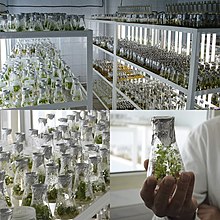Our website is made possible by displaying online advertisements to our visitors.
Please consider supporting us by disabling your ad blocker.
In vitro

In vitro (meaning in glass, or in the glass) studies are performed with microorganisms, cells, or biological molecules outside their normal biological context. Colloquially called "test-tube experiments", these studies in biology and its subdisciplines are traditionally done in labware such as test tubes, flasks, Petri dishes, and microtiter plates. Studies conducted using components of an organism that have been isolated from their usual biological surroundings permit a more detailed or more convenient analysis than can be done with whole organisms; however, results obtained from in vitro experiments may not fully or accurately predict the effects on a whole organism. In contrast to in vitro experiments, in vivo studies are those conducted in living organisms, including humans, known as clinical trials, and whole plants.[1][2]
- ^ "In vitro methods - ECHA". echa.europa.eu. Retrieved 2023-04-11.
- ^ Toxicity, National Research Council (US) Subcommittee on Reproductive and Developmental (2001). Experimental Animal and In Vitro Study Designs. National Academies Press (US).
Previous Page Next Page


